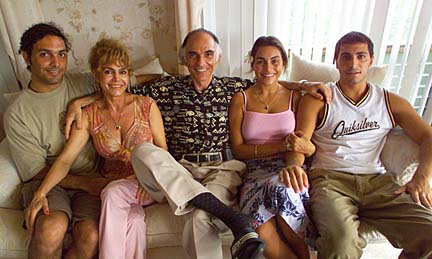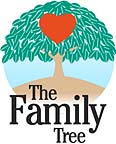

|
Surgeon’s family
spreads its wealth
Dr. Don Parsa's global
humanitarian missions inspire his
children to pursue careers in health
Dr. F. Don Parsa, his wife, Touri, and their children, Natalie, Alan and Sean, share a passion to do what they can to improve the lives of others.
 |
The children grew up going with him on hospital rounds on weekends and on medical missions to the Philippines and China. Alan and Natalie were trapped with their father on Cebu in 1989 when rebel soldiers captured the island.
"I'm sure a lot of kids at 8 or 9 get toy trains," said Alan, 27, entering St. George's University in New York as a third-year medical student from the University of San Diego. "I got a suture kit. I knew all the different knots."
It came in handy when he and his friends had surfing or hiking accidents, he said.
Alan, who went once to China and four times to the Philippines on medical missions, recalled going to Palawan, the most western island in the Philippines, when he was about 11.
He said he helped his dad by handing him instruments but he was so short he had to stand on a stool. "The first day we did 20 to 25 surgeries, all cleft palates."
Natalie, 28, a third-year medical student at the University of California Los Angeles, is finishing a surgery rotation at The Queen's Medical Center. Her husband, John Sheehan, graduated from the UH John A. Burns School of Medicine and has a physical medicine and rehabilitation residency at Stanford University.
"I was always brought up that medicine is the most noble experience," said Natalie, who went on three medical missions to the Philippines and one to China. "I really saw it there. That was the reason I chose medicine.
"It is an unbelievable sensation, just being able to touch people in such a profound way in such a short time. I never met such warm, loving people as on a medical mission. I want to give back something on a human level."
She and her husband both want to do medical missions when they finish their training, she said.
Sean, 23, went with his father on a mission to China and helped him with volunteer health work at the Institute for Human Services. But he is following a different path. He manages the Pacific Lending Group and is starting a business to provide financing for medical needs not covered by insurance.
"He's trying to apply the same humanistic principles helping others," his father said. "He's very good at it. He has to be reminded in business you can't be overly generous. He has a very giving nature."
Parsa's wife also makes a significant contribution, handling his office full-time "so I can really take care of patients," he said. "Touri really gives me peace of mind."
The Tehran-born surgeon is one of five doctors in a family of nine children. He said 21 family members, including cousins and nephews, are practicing physicians or attending medical schools across the country. All specialties are represented, he said.
He said his late father, Issa Parsa, was minister of culture and communications in Iran. "He was a humanist, philosopher and educator."
His father was born a Muslim but embraced Buddhism "because he felt all religions were absolutely identical, that they teach one thing, to care for and love other people," Parsa said.
"Dad's dream one day was for us kids, cousins, nieces and nephews, eventually to have a large multidisciplinary clinic. Destiny set us apart. I wish this was not the case because we grew up in an environment where our ohana was very, very strong," he said.
Parsa grew up in France and Switzerland and went to the Lausanne Medical School. He trained in microvascular and plastic surgery in Texas with famed heart surgeons Michael Debakey and Denton Cooley. He also trained in Paris with Paul Tessier, father of craniofacial surgery, before moving to Honolulu at the end of 1980.
Parsa said he was inspired by the works of Dr. Albert Schweitzer, humanitarian and medical missionary.
Doctors can improve the quality of people's lives with medical procedures "so they can be more accepted by our increasingly discriminating society," Parsa said. "It is such a gift we can give to our fellow humans."
Earlier this year, for example, he gave a priceless gift to a 30-year-old laboratory technician who was burned in an accident in the Philippines and brought here for treatment by the Aloha Medical Mission. He rebuilt the woman's disfigured face in three surgeries.
Parsa has been on many medical missions as a volunteer for 20 years with the Aloha Medical Mission and China Medical Fellowship. He has been to Turkey twice to do surgery at the invitation of plastic surgeons there and he has provided free medical services over the years at the Queen Emma Clinics and IHS.
He hopes eventually to work part-time and "continue my dreams of missionary work in Third World countries."
Parsa said doctors should be able to travel without politically imposed boundaries. "I feel where there's a need, one should be there to help."
hawaiimed.hawaii.edu